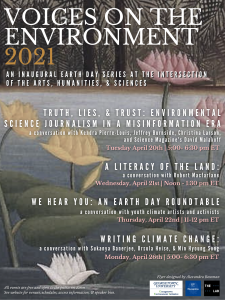New Voices on the Environment Series a Success

From April 20 to 26, 2021, the Georgetown Humanities Initiative, in partnership with the Georgetown Environment Initiative and the Laboratory for Global Performance & Politics, launched “Voices on the Environment,” the first run of what will become a yearly series of interdisciplinary events celebrating the earth at Georgetown, at the intersection of science, arts, and the humanities.
Journalism in the “Post-Truth Era”
In Truth, Lies, and Trust: Environmental Science Journalism in a Misinformation Era, three veteran science and environmental journalists who work in radio, television and print discussed what it is like to report on urgent environmental issues and cutting-edge science during an unprecedented era of misinformation, political polarization and distrust. Kendra Pierre-Louis (Climate reporter with the Gimlet audio show How to Save a Planet, formerly with The New York Times and Popular Science), Jeffrey Burnside (Documentary filmmaker and TV journalist, former president of the Society of Environmental Journalists), and Christina Larson (Global Science & Environment correspondent at the Associated Press; former China correspondent for Science Magazine), in conversation with David Malakoff (Deputy News Editor, Science Magazine; former editor at NPR’s Science Desk) addressed the constraints and opportunities they face in transforming facts, data, and differing perspectives into compelling stories that connect with their audiences. They highlighted what it means to be a journalist covering the climate crisis, threats to biodiversity, and public health challenges during what some have dubbed the “post-truth era.”
Nathan Hensley and Two Students Host Award-Winning Author Robert Macfarlane
In A Literacy of the Land: A Conversation, distinguished award-winning British writer Robert Macfarlane, author of Underland, The Lost Words, and Landmarks, talked about his creative projects on the environment and engaged in a rich discussion with English professor Nathan Hensley and two of his students Zoe Hubbard and Glen Waters, emphasizing the crucial role of language and imagination in writing about nature and elaborating on the authors who inspired his work.
Youth Artists and Activists Participate in We Hear You
We Hear You: Earth Day Roundtable Discussion gathered six youth artists and activists from around the world (Ashanee Kottage, Eliza Palter, Pauline Owiti, Beatrice Ann Dolores, and Myiah Smith) for an intimate conversation about their experiences of organizing and creating in response to climate crisis and chaos. Moderated by Caitlin Nasema Cassidy (Award-winning Actress and Producer, GU Alumna, and 2017-19 Fellow at Lab for Global Performance and Politics), this event launched We Hear You—A Movement, a large-scale, women-led performance project centering youth voices in the movement for climate justice. Drawing inspiration from climate strikes, block parties, and environmental science, We Hear You seeks to cultivate connections between ecosystems of performance and action. The project asks: Who are we listening to? What are the ways we can hear one another and our more-than-human kin? How can we celebrate our interconnectedness and activate it for resilience and healing?
Writing Climate Change with Distinguished Literary Critics
Writing Climate Change: A Roundtable featured distinguished literary and cultural critics Sukanya Banerjee (UC Berkeley), Ursula Heise (UCLA), and Min Hyoung Song (Boston College) who reflected on the meaning and role of “writing” in our understanding of climate change. What difference do genre and mode make in thinking about our environmental crisis and its repair? Beyond mere transmission of scientific ideas, can language, emplotment, and imagination rewire affective circuits, reorient our historical consciousness and our sense of social justice, and recalibrate our relationship with the environment?
The roundtable was moderated by Professor Nicoletta Pireddu and Israel Hernandez Luna (Graduate program in Spanish and Portuguese).